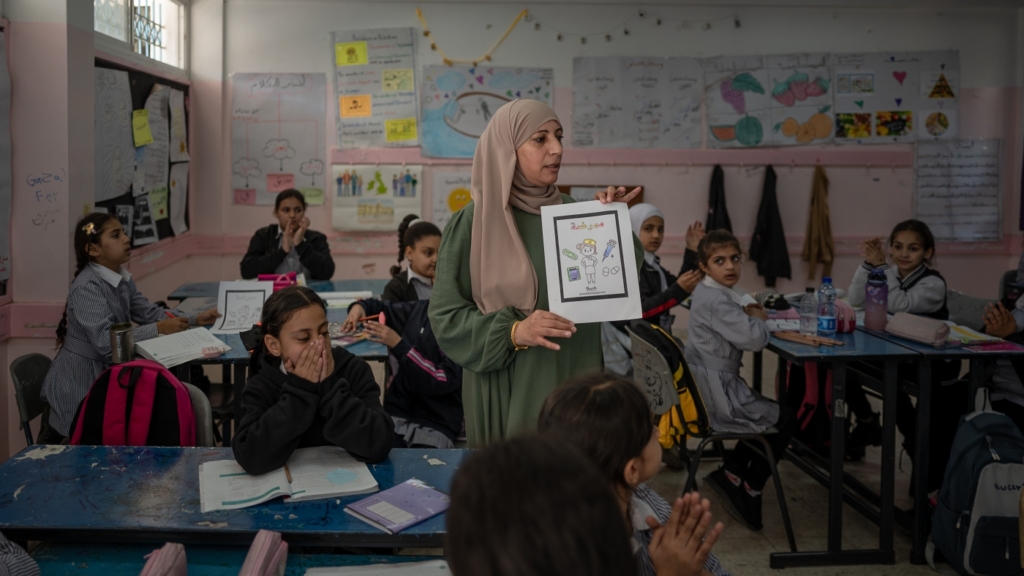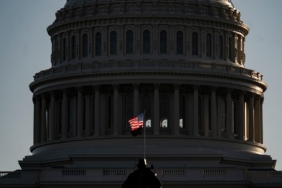A teacher leads a class at a school for girls administered but the main U.N. agency for Palestinian aid, UNRWA, in Qalandia refugee camp, near Ramallah, in the West Bank, on Nov. 14.
Afif H. Amireh for NPR
hide caption
toggle caption
Afif H. Amireh for NPR
RAMALLAH, West Bank — In a classroom near the Israeli-occupied West Bank town of Ramallah, first-graders enthusiastically call out their Arabic ABCs as a teacher prompts them from a chart on the wall.
About 600 girls up to ninth grade attend this elementary/preparatory school, located inside the Qalandia refugee camp. It is one of about 100 schools — with a total of 45,000 students — in the West Bank and East Jerusalem that are operated by UNRWA, the United Nations agency that provides aid to Palestinian refugees.
“The students here suffer from many pressures in life, both social and economic,” says principal Rana Nabhan.
Nabhan explains that without schools like this, which allow students to attend for free, many of the girls would receive no education at all. The other options are simply too expensive for refugee families.
Schoolgirls at an UNRWA school in Qalandia, in the West Bank, on Nov. 14.
Afif H. Amireh for NPR
hide caption
toggle caption
Afif H. Amireh for NPR
But new legislation requiring Israel to cut ties with UNRWA has thrown the future of Qalandia and the agency’s other schools into doubt. A question mark also hangs over dozens of UNRWA-operated health clinics, and the wide-ranging social services the agency provides not only in the West Bank and East Jerusalem, but also in war-torn Gaza. Without the cooperation of Israel that has existed since UNRWA’s inception some 75 years ago, many fear the agency cannot continue functioning, as supplies and staff are halted at Israeli checkpoints.
As Israel slams UNRWA, the agency defends its work
UNRWA’s original mandate was to provide aid for the approximately 750,000 Palestinians displaced during the creation of the modern state of Israel in 1948. Refugee status has been passed down through generations and allows the descendants to continue receiving services from the agency. UNRWA later took on responsibility for helping hundreds of thousands more displaced from the 1967 Six-Day War. Now about 5.9 million refugees are eligible for UNRWA services not only in Gaza and the West Bank, but also Jordan, Lebanon and Syria.
But critics on Israel’s right wing have long argued that UNRWA perpetuates hatred toward Israel and that the practice of inherited refugee status creates a cycle of dependency. In 2019, a prior Israeli attempt to ban UNRWA, citing concerns over “corruption and mismanagement,” was unsuccessful.
UNRWA staff and security walk along the street in Qalandia on Nov. 14.
Afif H. Amireh for NPR
hide caption
toggle caption
Afif H. Amireh for NPR
People walk past an UNRWA building in Am’ari, east of the city of Ramallah, in the West Bank, on Nov. 13.
Afif H. Amireh for NPR
hide caption
toggle caption
Afif H. Amireh for NPR
The push to bar UNRWA gained renewed momentum after Israeli officials accused UNRWA staff of involvement in the Hamas-led attack on Israel on Oct. 7, 2023, according to Israel’s government. The U.N. agency said it would investigate the claim and swiftly dismissed a dozen workers. But Israel has not provided evidence supporting the allegation of larger participation of UNRWA staff.
Speaking to an advisory committee in Geneva last week, UNRWA Commissioner-General Philippe Lazzarini said the agency has been the target of a “global disinformation campaign” led by Israel that is “premised on the misguided belief that if UNRWA disappears, so will the issue of Palestine refugees.”
He said UNRWA’s critics were justifying their attacks by accusing the group of collusion with and infiltration by Hamas. Pointing to a U.N. review that he said “found that the agency has a more robust approach to neutrality than comparable entities,” Lazzarini said: “While we do not operate in a zero-risk environment, we take a zero-tolerance approach to any proven breaches.”
Students participate in class in an UNRWA girls’ school in Qalandia, on Nov. 14.
Afif H. Amireh for NPR
hide caption
toggle caption
Afif H. Amireh for NPR
Boaz Bismuth, a member of the Israeli parliament from the governing Likud party, alleges there is evidence there are “hundreds of UNRWA agents who belong to Hamas,” but would not say what the proof is.
Bismuth, who sponsored one of the two anti-UNRWA bills, says Israel or some other aid organization will step in to fill the void left by the agency.
However, Paul Spiegel, director of the Center for Humanitarian Health at Johns Hopkins University, says, “I have seen no concrete plan” to take over from UNRWA.
Spiegel is concerned that the situation will deteriorate after Jan. 28, when the ban goes into effect, because it’s almost impossible for another agency to step in and quickly assume the role that UNRWA has played for so long. “UNRWA has had years [to establish] logistics and … people in the field. You can’t just replace that overnight,” he says.
Thousands to go without school
Not far from the Qalandia girls school, 15- to 18-year-olds at an UNRWA vocational school are learning diesel mechanics and construction-related skills to prepare them for jobs such as electrician and plumber.
Nooreddin Saba’e, 18, is focused on a project board that simulates a bathroom installation — running wire between circuit breakers, outlets and switches. He says the free tuition that the UNRWA center provides was a big factor in him enrolling here.
“They can’t cut off UNRWA. If they do, a lot of students won’t be able to keep learning,” he says. “It will make getting this education really difficult.”
Students receive hands-on training in the UNRWA vocational center in Qalandia, Nov. 14.
Afif H. Amireh for NPR
hide caption
toggle caption
Afif H. Amireh for NPR
An UNRWA vocational training center in Qalandia prepares students for work as electricians, plumbers and other fields.
Afif H. Amireh for NPR
hide caption
toggle caption
Afif H. Amireh for NPR
Job skills like these are especially important right now. Since the start of the war in Gaza, unemployment in the West Bank has skyrocketed, going from 12.9% before the conflict to 32%, according to U.N. data. What’s more, UNRWA is the second-largest employer in the West Bank after the Palestinian Authority, so the agency’s collapse would throw even more people out of work.
No one can predict with certainty how events will unfold on the ground starting Jan. 28. Amid the ongoing war in Gaza, humanitarian aid groups are grappling with the immense challenge of meeting even a fraction of the urgent needs of a population devastated by more than 13 months of Israel’s bombardment and tight restriction on the flow of aid into the enclave. Meanwhile, in the West Bank and East Jerusalem, the key issue is whether Israel’s severing of ties with UNRWA would lead to the rapid collapse of the agency’s operations or result in a more gradual strangulation of its efforts.
UNRWA’s Qalandia vocational school provides instruction to students ages 15 to 18.
Afif H. Amireh for NPR
hide caption
toggle caption
Afif H. Amireh for NPR
In his remarks in Geneva, Lazzarini warned that Israel’s ban would have “catastrophic consequences” for UNRWA’s operations in Gaza and the West Bank. “In the West Bank, UNRWA’s collapse would deprive at least 50,000 children of education, and half a million Palestine Refugees of primary health care,” he said.
Speaking with NPR, Jonathan Fowler, a spokesman for UNRWA, acknowledges, “we’re in a very nebulous situation.” He says if UNRWA is pushed out of the picture, Israel would be responsible for the Palestinians refugees currently under the agency’s charge. “Under international humanitarian law, it is incumbent upon an occupying power to look after the well-being of a population under occupation,” he says.
Public health could suffer
The Qalandia Camp Health Clinic is another UNRWA-run facility. It sees a few hundred patients a day and the tiny waiting room is normally crowded. Itaf Shada, 60, sits patiently waiting to be called for her appointment. She’s a widow and has a litany of health issues — diabetes, high blood pressure, osteoporosis.
“I’ve got no money. I’ve got nobody to take care of me,” she says.
Shada has been receiving services from UNRWA for 23 years and insists that if not for this clinic, she would be dead. “For poor people like us, UNRWA is like an artery. It’s what keeps us alive.”
People walk by a health clinic administered by UNRWA in Qalandia refugee camp.
Afif H. Amireh for NPR
hide caption
toggle caption
Afif H. Amireh for NPR
Hiam Hawarin holds her baby in an UNRWA clinic in Qalandia, on Nov. 14.
Afif H. Amireh for NPR
hide caption
toggle caption
Afif H. Amireh for NPR
Seated near Shada is Hiam Hawarin, who is holding her 7-month-old daughter. The baby looks small for her age — just 9 pounds, her mother says — and she’s losing weight. “She has a cough,” she says. “She was born with only one kidney.”
Hawarin, 33, reveals that she isn’t actually a refugee. But she’s come to the clinic in desperation hoping to get seen by a doctor. “My husband used to work in Israel, but he lost his job. And we lost our insurance,” she says.
Majida Nasr is a physician who worked in this clinic for more than 25 years. Today, she’s training student doctors.
Dr. Majida Nasr (left) treats a patient at the UNRWA clinic in Qalandia, Nov. 14.
Afif H. Amireh for NPR
hide caption
toggle caption
Afif H. Amireh for NPR
They won’t turn Hawarin and her baby away, Nasr says, but there are limits. They can see her, but they won’t be able to prescribe any medication.
Nasr says it’s not uncommon for non-refugees to show up hoping for treatment.
“The Palestinian people view UNRWA as a savior. Because they have nowhere else to go,” she says.
Michael Levitt contributed to this story.


















Yorumlar kapalı.